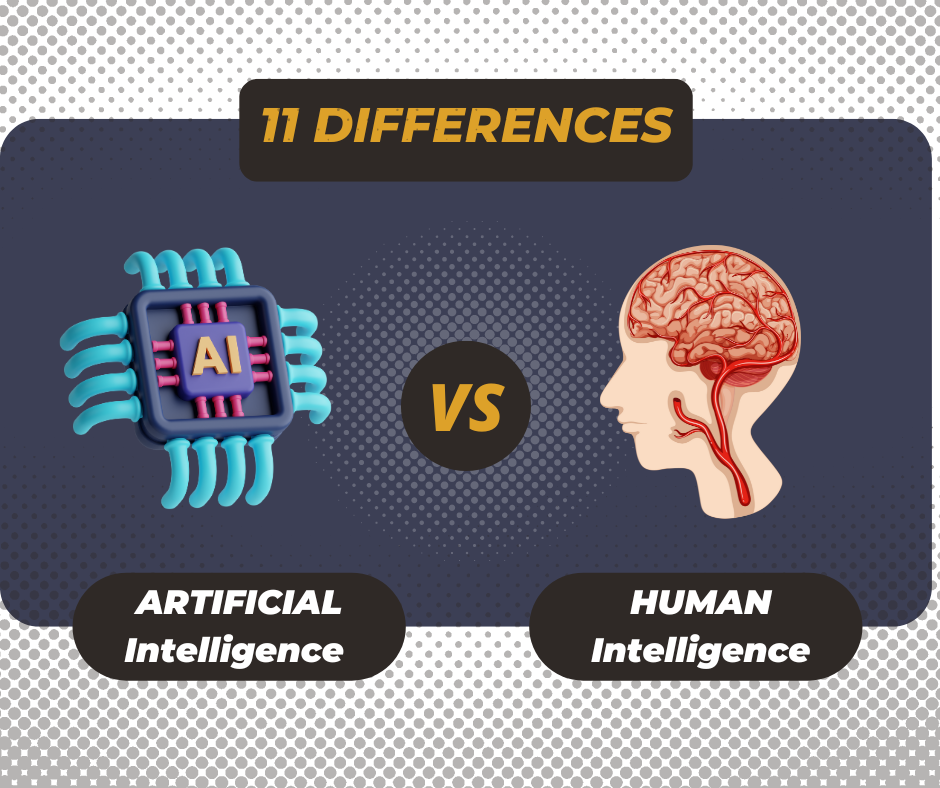Introduction to the topic: Human Intelligence vs Artificial Intelligence
In the realm of intelligence, the interplay between human cognition and artificial intelligence (AI) has captivated the world for decades. While human intelligence has evolved over millions of years, the rise of AI has opened new frontiers in the world of technology. Understanding the distinctions between these two forms of intelligence is crucial in comprehending their respective capabilities, limitations, and implications. In this blog, we will explore 11 factual differences that set human intelligence and artificial intelligence apart, shedding light on the current scenario and providing insights into future predictions.
Factual Background of the topic: Human Intelligence vs Artificial Intelligence
Human intelligence, an intricate result of the human brain’s complex neural architecture, is a remarkable product of evolution. From our ancestors’ primitive cognitive abilities to the sophisticated cognitive processes seen in modern humans, our intelligence has facilitated our survival, creativity, and problem-solving prowess. With the advent of artificial intelligence, however, a new era has emerged. AI refers to computer systems designed to perform tasks that typically require human intelligence, such as speech recognition, decision-making, and pattern recognition.
Current Scenario of the topic: Human Intelligence vs Artificial Intelligence
In recent years, AI has made significant strides, revolutionizing various industries, including healthcare, finance, and transportation. Machine learning algorithms, neural networks, and big data have fueled AI’s progress, allowing it to process vast amounts of information and recognize patterns that humans might overlook. AI systems have demonstrated impressive feats, such as defeating human champions in complex board games and outperforming professionals in specific tasks. However, they still fall short in replicating the breadth and depth of human intelligence.
Future Predictions of the topic: Human Intelligence vs Artificial Intelligence
Looking ahead, the future of AI appears promising. Advancements in deep learning, natural language processing, and robotics are expected to push the boundaries of AI capabilities even further. However, experts predict that bridging the gap between human intelligence and artificial intelligence remains a monumental challenge. While AI may continue to augment human capabilities in specific domains, achieving a true, human-like general intelligence remains elusive.
In the following sections, we will delve into some basic difference between human intelligence and artificial intelligence. By examining these distinctions, we can gain a comprehensive understanding of the unique characteristics, strengths, and limitations of each form of intelligence. So, let’s embark on this fascinating journey and explore the nuances that define human cognition and artificial intelligence.
11 factual differences between human intelligence and artificial
-
-
Origins of human intelligence and artificial intelligence:
Human intelligence is a product of the highly complex neural structure of the human brain. It is the result of millions of years of evolution, genetic factors, and the interaction between our biological systems. On the other hand, artificial intelligence is created by humans through the development of algorithms and computational systems. It is a deliberate engineering effort to mimic or replicate certain aspects of human intelligence.
-
-
-
Learning Process:
Humans acquire knowledge through a combination of innate abilities, sensory experiences, and learning from others. We have the ability to generalize information, make connections, and extract meaning from various sources. In contrast, AI systems learn through data-driven algorithms. They analyze large amounts of data, identify patterns, and use statistical models to make predictions or decisions.
-
Creativity and Intuition:
Human intelligence encompasses the ability to think creatively, generate novel ideas, and make intuitive leaps. We can come up with innovative solutions, engage in artistic expression, and exhibit imagination. AI systems, although capable of generating outputs based on patterns and rules, currently lack the capacity for true creativity and intuition. They rely on predefined algorithms and cannot exhibit genuine imagination.
-
Emotional Intelligence:
Humans possess emotional awareness, empathy, and the ability to interpret and respond to emotions in ourselves and others. We can understand and express complex emotions, which significantly influences our decision-making processes. AI systems, being devoid of emotions, lack the ability to comprehend or express emotional intelligence. They can analyze text or facial expressions to infer emotions but lack true emotional understanding.
-
Contextual Understanding:
Humans effortlessly understand contextual nuances and interpret ambiguous situations based on our vast background knowledge and experiences. We can infer meaning from subtle cues, adapt to varying circumstances, and handle novel situations. AI systems, however, typically require explicit instructions and struggle with grasping context unless explicitly provided with relevant information.
-
-
Physical World Interaction:
Human intelligence is closely intertwined with our physical bodies, enabling us to interact with the physical world using our senses, motor skills, and manipulation abilities. We can navigate environments, manipulate objects, and engage in physical activities. AI, in contrast, is primarily confined to virtual environments or specific robotic applications and lacks direct physical interaction capabilities.
-
Common Sense Reasoning:
Human intelligence incorporates a broad sense of common sense knowledge that allows us to reason about everyday situations and handle novel scenarios. We possess a deep understanding of the world, including causal relationships, social norms, and general knowledge. AI systems, while capable of learning from large datasets, typically lack this broad understanding of common sense. They rely heavily on the specific training data they have been provided.
-
Moral and Ethical Judgment:
Humans possess a moral compass that guides our decision-making processes, considering societal norms, values, and ethical considerations. We have a sense of right and wrong, which enables us to make judgments based on principles and empathy. AI lacks inherent moral judgment and depends on programmed rules or guidelines set by humans, making it unable to fully grasp the nuances of complex ethical situations.
-
Subjectivity and Bias:
Human intelligence is susceptible to subjective biases and individual perspectives. Our background, experiences, and cultural factors shape our thinking and decision-making processes. AI algorithms, when trained on biased or incomplete datasets, can inadvertently reflect and amplify these biases, leading to unfair or skewed outcomes. Efforts are being made to mitigate bias in AI systems, but it remains a significant challenge.
-
Adaptability and Flexibility:
Human intelligence demonstrates a remarkable ability to adapt to new environments, learn new tasks, and generalize knowledge across different domains. We can apply prior knowledge to new situations and demonstrate flexibility in our thinking and problem-solving. AI systems, while capable of learning from new data, often require retraining or fine-tuning to perform well in unfamiliar scenarios. They lack the generalization capabilities and adaptability that humans.
-
Consciousness and Self-Awareness:
Human intelligence involves self-awareness and consciousness, while AI lacks consciousness and subjective awareness, functioning purely as computational processes.
These distinctions highlight the remarkable capabilities of human cognition and the evolving landscape of AI technology. Understanding these differences is crucial as we navigate a world where AI increasingly permeates various aspects of our lives.
Ultimately, human intelligence and artificial intelligence represent two distinct but interconnected realms of cognition. Embracing a holistic understanding of their differences and synergies will empower us to navigate the ever-evolving landscape of technology and shape a future where AI serves as a powerful tool for human progress, while preserving the essence of what makes us uniquely human.





